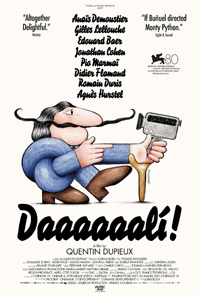Good Golly, It’s Dali: Dupieux Dreams Surreal in Distinctive Biopic
 It seems surrealism’s pioneer Salvador Dali is experiencing something of a culturally concentric resurgence as a cinematic subject, granted his most appropriately thematic rendering yet in Quentin Dupieux’s Daaaaaali!, the second feature this year from the idiosyncratic director, who is also kinda sorta delivering his first biopic. Arriving shortly after Mary Harron’s shockingly stilted Daliland, featuring Ben Kingsley as the iconic artist, Dupieux formulates his own expectedly original rendering, presenting something more along the lines of Portrait of an Artist as a Difficult Man. Much like Todd Haynes did with Bob Dylan, a revolving door of actors portray Dali, sometimes switching freely in scenes dealing with carefree anachronisms regarding his life and work.
It seems surrealism’s pioneer Salvador Dali is experiencing something of a culturally concentric resurgence as a cinematic subject, granted his most appropriately thematic rendering yet in Quentin Dupieux’s Daaaaaali!, the second feature this year from the idiosyncratic director, who is also kinda sorta delivering his first biopic. Arriving shortly after Mary Harron’s shockingly stilted Daliland, featuring Ben Kingsley as the iconic artist, Dupieux formulates his own expectedly original rendering, presenting something more along the lines of Portrait of an Artist as a Difficult Man. Much like Todd Haynes did with Bob Dylan, a revolving door of actors portray Dali, sometimes switching freely in scenes dealing with carefree anachronisms regarding his life and work.
Judith (Anaïs Demoustier) desires to be a documentarian, even though she studied pharmaceuticals and has no real world experience. However, she’s booked an interview with Salvador Dali for a print interview. When he arrives at the hotel, he’s dismayed that there are no cameras, and abruptly leaves. Eventually, he gives Judith another chance after she’s teamed with a producer (Romain Duris), who is interested in turning the experience into a documentary feature. But their next meeting proves to be disastrous when Dali wrecks their camera, too impatient to wait for it to be repaired. Thanks to Judith’s tenacity, they’ll meet again, but she’ll again be foiled when Dali insists on being behind the camera, insistently interviewing her, much to the chagrin of her producer.
Essentially, Daaaaaali! isn’t so much a biopic as it is a utilization of his own artistic tendencies, and often feels like the Luis Bunuel version of the artist, with whom Dali collaborated on the surrealist cinematic masterpiece Un Chien Andalou (1929). The naive pharmacy tech-turned-journalist played by Dupieux regular Anais Demoustier, whose attempts to interview Dali are constantly undermined and thwarted, are reminiscent of the characters who can never seem to sit down for a meal in The Discreet Charm of the Bourgeoisie (1972) or the revelers who simply cannot leave the party in The Exterminating Angel (1962). Dupieux’s playfulness never dips into any real anguish or tension, despite Judith finding herself eventually demeaned by Romain Duris as a somewhat useless producer for her documentary.
The film’s essence plays the best with Dupieux’s Russian doll aesthetics, utilizing a layered dream-within-a-dream mechanism employed by a priest with whom Dali dines with. There’s a Lynchian homage to the backwards speaking pattern of The Man From Another Realm in Twin Peaks, though these moments often seem frivolous, if interesting, flourishes. At times, Dupieux’s comedic angle lends itself to the antics of a Naked Gun or an Airplane! film. Of all the actors donning Dali, including Pio Marmai, Jonathan Cohen, Gilles Lellouche and Alain Chabat, the most effective persona goes to Eduoard Baer.
Silly and often disarming, Dupieux’s presentation of his subject is a bit scattershot and even chaotic, and works more successfully in its subtexts regarding our reverence for the cult of personality and a normalized, overt disrespect for women, who, even when behind the camera, are expected to transfix an appropriately performative element of femininity.
Reviewed on September 7th at the 2023 Venice Film Festival – Out of Competition. 77 Mins.
★★★/☆☆☆☆☆


